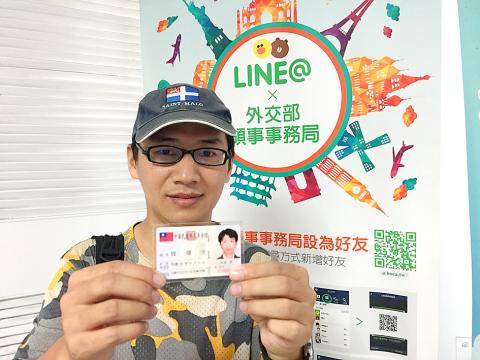Former Chinese citizen Zhou Shuguang (周曙光), who yesterday applied for a Republic of China (ROC) passport after becoming a naturalized citizen and obtaining an ROC identification card on Thursday, has expressed an interest in running for public office so that he can experience democracy in action.
The journalist, who achieved international fame after exposing Beijing injustices on his blog, yesterday said that he appreciates, but does not shy away from, the symbolism of requesting an ROC passport on the 29th anniversary of the Tiananmen Square Massacre.
Zhou, also known as Zoula (佐拉), became qualified to obtain ROC citizenship after residing in Hualien’s Rueisui Township (瑞穗) with his Taiwanese wife for the past seven years.

Photo: Wang Chun-chi, Taipei Times
An information technology engineer by profession, Zhou was born in 1981 in China’s Hunan Province, and gained renown as an independent journalist when he used his blog as a platform to publish stories on Beijing’s land appropriations, suppression of freedom of speech and oppression of ethnic minorities.
In 2008, he covered unrest in Tibet, riots in Guizhou and a politically motivated knife attack in Shanghai, for which he was arrested and detained without charges.
Zhou said that his activism attracted the attention of the Chinese government, and that he was frequently ordered by the security services to present himself at their offices for questioning.
“They often asked me where I had gone, whom I had seen and why I had seen them. My life was being monitored and they had even cut my telephone line,” he said yesterday. “During the Olympics, I was put under house arrest to prevent me from going out or reporting on anything.”
In 2009, he was prevented by the police from organizing a conference in Beijing on the anniversary of the massacre, Zhou said, adding that they expelled him from the city and barred him from attending any events related to the massacre.
He took a photograph of the Great Wall of China and posted it online — it became a symbol of defiance to state censorship, he said.
Observing Taiwanese politics since his immigration, Zhou has found the elitism of the Chinese Nationalist Party (KMT) to resemble that of the Chinese Communist Party, he said.
The Democratic Progressive Party, which originally branded itself as being close to the people, has become less daring since becoming the ruling party, he added.
After being a Taiwanese resident for 10 years — an eligibility requirement for public office — he would like to run for borough warden, Zhou said.
“It would be interesting to experience Taiwanese democracy as a political candidate,” he said.

Chinese Nationalist Party (KMT) Chairman Eric Chu (朱立倫), spokeswoman Yang Chih-yu (楊智伃) and Legislator Hsieh Lung-chieh (謝龍介) would be summoned by police for questioning for leading an illegal assembly on Thursday evening last week, Minister of the Interior Liu Shyh-fang (劉世芳) said today. The three KMT officials led an assembly outside the Taipei City Prosecutors’ Office, a restricted area where public assembly is not allowed, protesting the questioning of several KMT staff and searches of KMT headquarters and offices in a recall petition forgery case. Chu, Yang and Hsieh are all suspected of contravening the Assembly and Parade Act (集會遊行法) by holding

PRAISE: Japanese visitor Takashi Kubota said the Taiwanese temple architecture images showcased in the AI Art Gallery were the most impressive displays he saw Taiwan does not have an official pavilion at the World Expo in Osaka, Japan, because of its diplomatic predicament, but the government-backed Tech World pavilion is drawing interest with its unique recreations of works by Taiwanese artists. The pavilion features an artificial intelligence (AI)-based art gallery showcasing works of famous Taiwanese artists from the Japanese colonial period using innovative technologies. Among its main simulated displays are Eastern gouache paintings by Chen Chin (陳進), Lin Yu-shan (林玉山) and Kuo Hsueh-hu (郭雪湖), who were the three young Taiwanese painters selected for the East Asian Painting exhibition in 1927. Gouache is a water-based

Taiwan would welcome the return of Honduras as a diplomatic ally if its next president decides to make such a move, Minister of Foreign Affairs Lin Chia-lung (林佳龍) said yesterday. “Of course, we would welcome Honduras if they want to restore diplomatic ties with Taiwan after their elections,” Lin said at a meeting of the legislature’s Foreign Affairs and National Defense Committee, when asked to comment on statements made by two of the three Honduran presidential candidates during the presidential campaign in the Central American country. Taiwan is paying close attention to the region as a whole in the wake of a

OFF-TARGET: More than 30,000 participants were expected to take part in the Games next month, but only 6,550 foreign and 19,400 Taiwanese athletes have registered Taipei city councilors yesterday blasted the organizers of next month’s World Masters Games over sudden timetable and venue changes, which they said have caused thousands of participants to back out of the international sporting event, among other organizational issues. They also cited visa delays and political interference by China as reasons many foreign athletes are requesting refunds for the event, to be held from May 17 to 30. Jointly organized by the Taipei and New Taipei City governments, the games have been rocked by numerous controversies since preparations began in 2020. Taipei City Councilor Lin Yen-feng (林延鳳) said yesterday that new measures by